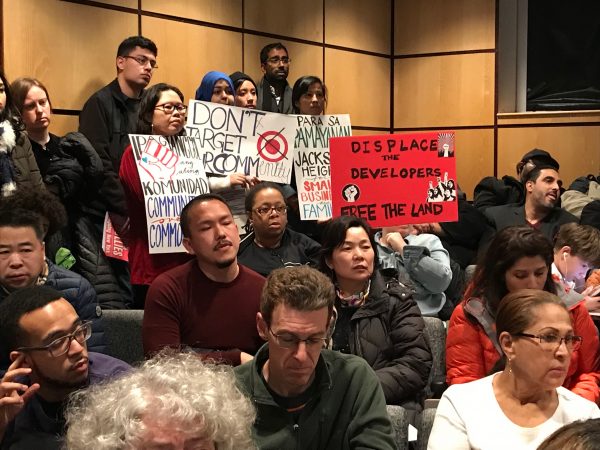
Community members protest the rezoning
March 14, 2018 By Tara Law
Queens Community Board 4, which covers Elmhurst and Corona, rejected a spot rezoning application on Tuesday that would permit a developer to construct a 13-story building on 82nd Street.
The board issued their decision after listening to an impassioned town hall meeting, in which residents and local business owners begged the board to halt the project and prevent its potentially gentrifying impact on the neighborhood.
The community board’s advisory vote will be considered by the Borough President and other City officials as the application process continues. If ultimately approved by the City, the proposal would bring a small Target, nine stories of apartments and 128 parking spaces into the neighborhood.
The community board voted down the proposal during a meeting immediately following a public hearing in an Elmhurst Hospital auditorium. They also issued a recommendation to downzone the property as it stands now, to further minimize the impact of what could be built there.
The developers, Sun Equity Partners and Heskel Group, have a right to build a 10-story, 113 foot tall building at 40-31 82nd St without rezoning. The building would have a single-story commercial space and 77 market-rate apartment units across nine residential floors.
With rezoning, the building could rise 13 stories and be 145 feet tall. The building would have 120 units across 11 residential floors, 30 percent of which would be affordable housing under the developer’s current plan.
Dozens of community members stood before a crowd of approximately 200 people and argued for nearly three hours that the development will drive up real estate prices, force out small businesses and increase crowding in the neighborhood. Concerned community members sat on the floor and stood in the aisles to observe the meeting or to wait for their turn to speak.
Though community members raised many different problems that they see with the development, were united in opposing it. Board Chairperson Damian Vargas repeatedly asked the attendees to remain quiet, but the crowd frequently broke into chanting and applause.
A number of residents expressed concerns with rising costs in the neighborhood, including Daria Matos. Matos said that she has lived in the neighborhood for 30 years, but has decided that remaining in the area is untenable.
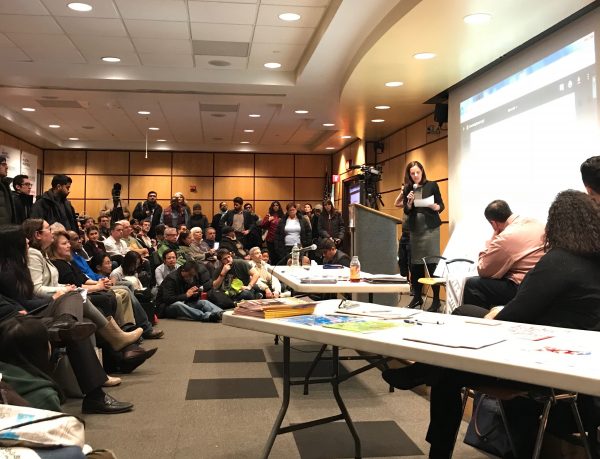
A representative from Sun Equity Partners presents the developer’s proposal
“Me and my husband would love to raise our children here, but unfortunately we cannot,” said Matos. “We cannot afford to buy an apartment, we cannot afford to buy a home here.”
Residents also complained about crowding on public transportation, in local schools and on the neighborhood’s streets. Jomarie Cruz, a nurse at Elmhurst Hospital, said that she worried ambulances carrying mothers in labor would be held up in traffic.
Several business owners talked about their concerns that incoming corporate businesses would force out family-owned stores in the area.
A man speaking through a translator gave his name as Zang and said that he was the owner of New J & B Thrift Shop. Zang said that he is concerned about competition from Target, and explained that his business supports his children and several other families.
“As a small business owner, this is truly a detriment to his business, to his children, to the community,” the translator said.
Ultimately, a majority of the community board agreed to deny the application and motioned to downzone the property.
However, several members of the community board expressed frustration that their board can only make a recommendation on the rezoning, and cannot prevent the application from going forward.
Community boards serve an advisory role, and can only make a recommendation to legislators and officials about rezoning proposals. The board will submit its decision the Borough President, who will consider the application along with the City Planning Commission, the City Council and finally the Mayor.
The board is also unable to block the new Target, which has already signed a lease with the developer.
“Regardless of whether we vote yes or we vote no—I’m not saying that it’s out of our hands and it’s over now—but Target is coming,” said Chairperson Vargas.
The board members discussed submitting a package of additional recommendations with the denial in the event that the rezoning is approved by the City.
These recommendations may include asking the developer to reconfigure its plans for affordable housing to make more of the housing available to families with lower incomes. The affordable housing rates were set by the city under the Mandatory Inclusionary Housing law.
The developer has currently agreed to an affordable housing configuration that would designate 30 percent of the apartments as affordable, or about 36 units, if the property is rezoned. These units would be available to families of three making an average of 80 percent AMI, or $65,000.
The inclusionary housing plan would make 20 percent of the apartment units affordable housing, or about 24 units. These units would be available to families of three making an average of 40 percent of the AMI, or about $33,000.
18 Comments

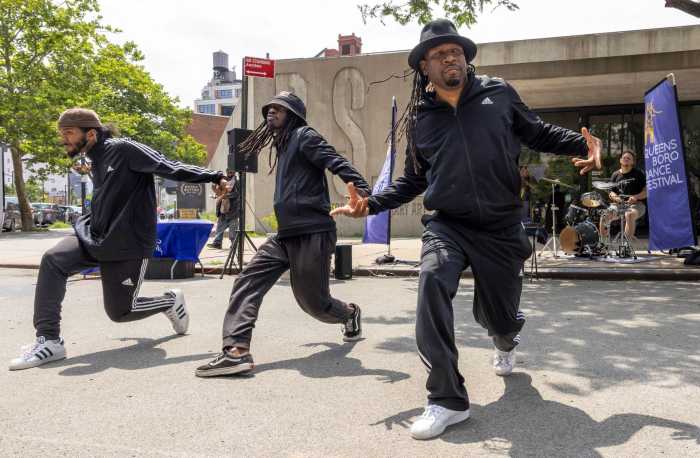
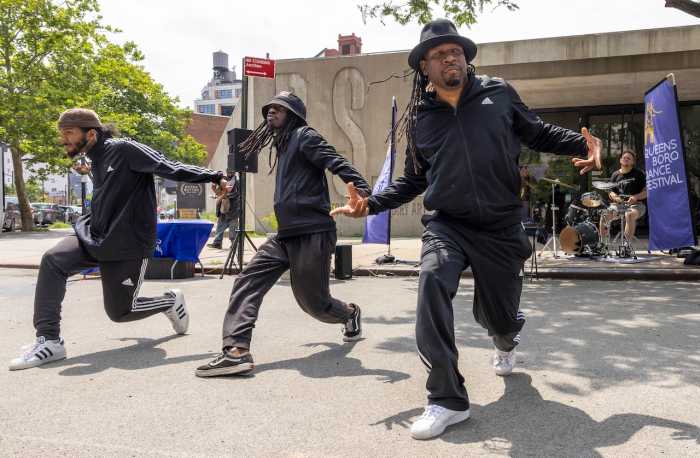

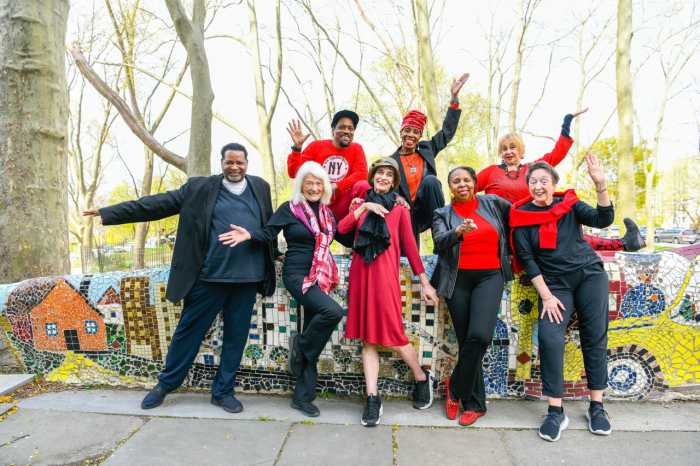
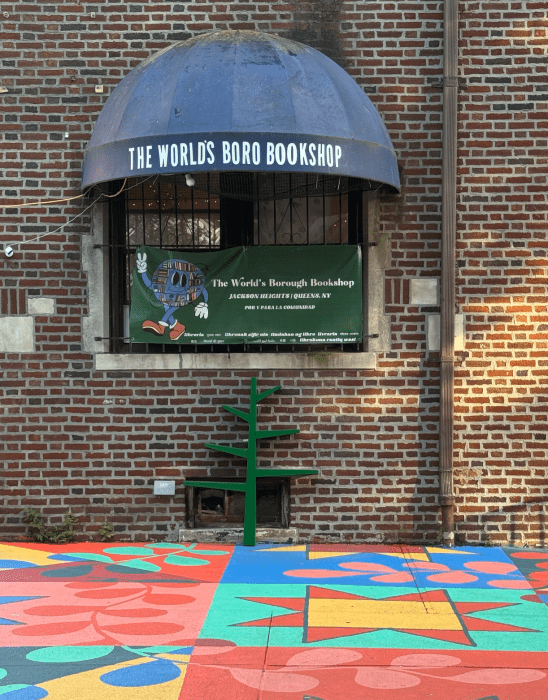

Do people consider Flushing gentrified (another issue which is telling of American society) ? No, they don’t but prices are high as hell. People consider it gentrification if white people are moving in and opening up high-end and high priced shops. The problem is people rent by room and pack people into there around here and of course nothing is done (which is fine by me because it’s good for the economy). Why don’t overcrowding argument people bring that up? Room renting is why the price of a single family is 850k here. Maybe they play a part in it that and are jealous. This would increase housing and allow some people to buy or rent in the neighborhood. New people would increase business in the area. Have you ever heard someone say they never should have re-zoned Manhattan? The whole arguement is terrible. It’s being used for political purposes and to gain the favor of voters by multiple candiates. It’s racist against Asian American developers who are creating more housing and taking financial risks which better the community. Re zoning creates wealth for property owners in the surrounding area (Elmhurst residents and investors). God forbid the economy does well for people that had to suffer through the recent recession. The place was a dump before and the outcry should have been greater when it was abandoned. Some small business owners would benefit from Target AND the apartments but now if it is only commercial they will suffer because they aren’t building the apartments. I’m sure some people from the apartments would have patronized the stores on 82nd for the bakery, meat market and fruit market which already has competitive prices and charm. The whole thing is backward, ignorant and prejudiced against Asian Americans.
From my perch as a Queens expatriate in Arizona, I would recommend dropping the gentrification argument. The 1938-39 high-rise apartment boom that produced buildings like those where I delivered the Star-Journal long ago at 40-71 and 40-60 Elbertson Street, and all along Hampton Street leading to the disputed site, did not bring gentry to Elmhurst. Neither did 1950’s 40-45 Elbertson and the adjacent buildings along Denman Street. All these were just dignified dwellings for the working class, and so would be the units in the building you are concerned about. However, I do agree that the proposed Target is grossly out of place. I think that a much more appropriate design would be a building like 1963’s 40-05 Hampton street, which replaced a strip of storefronts (and my Star-Journal field office) with six stories of residential units and some professional offices.
[…] Read about the community response to the 82nd Street rezoning here. […]
I welcome this project. The movie theater was old and not operational any longer. For the last few years it was dangerous as it had been a place for drug addicts and prostitution. The new housing will help the community. This is not gentrification… it’s the rebuilding of a property that should have been demolished years ago. Jackson heights was built 80-100 years ago and there are hardly any properties left to build
nyc needs more housing. rejecting the additional housing is going to increase rents.
I welcome Target; it will improve the area currently filled with rundown looking retail stores.
Please stop using the word “gentrification” when it doesnt apply. Parking spaces and a Target are not gentrifying anything. This isnt artisanal doughnuts and luxury townhouses. That word get misused so often.
Furthermore, 30% affordable housing and people are still complaining? Should the developer just build a housing project instead? The example given is a woman who has lived in the neighborhood for 30 years and is complaining she can no longer afford to buy anything here…I would argue that if she hasnt bought anything here in 30 years, she never had any intention to.
The woman who said she lived there 30 years also talked about wanting to raise her kids in the neighborhood, but not being able to do so. If she has young children, it’s possible that she lived in JH from childhood to early 30s and is just now in a position to start buying a place. JH is really expensive though. It is hard for a young person, much less one with a family, to afford to buy there unless they have amazing jobs and/or family money.
I really hope Queens doesn’t lose its charm or authenticity!!! 🙁
Are you crazy? It lost it 30 years ago
It may raise rents to some degree. However, making certain that there remains rent stable apartments affordable to neighborhood residents can and should be done. In the mean time, to continue to maintain and encourage stores and services that are nothing more than junk goods and services is a serious mistake. There is not a single business on 82nd Street that is worth worrying about its survival. If you go into these stores without of a command of Spanish, it is very difficult/impossible to get clerks to wait on you. Sorry folks, but this is or should be a bilingual neighborhood. I for one am tired of being told by recent immigrants that they are here in the US to get all that they can get out of living here and returning home with pockets lined with money. They have little or no investment in the community that is of a lasting nature. This needs to change.
To support my suggestion that many of the recent arrivals to the neighborhood have little or no investment in the neighborhood, just look at the amount of trash and dog waste that are left on the streets of JH. Regardless of where you go in JH you routinely see people just throw their trash on the sidewalk; open the doors to their vehicles and dump their trash in the gutter. People who take pride and have an investment in the neighborhood would not be doing this behavior.
I have news for you: Rash and dog waste is not just a JH problem, nor is it just a recent immigrant problem. NYC is filthy because many of the people in it are filthy. Dog waste is all over the streets of LIC and Forest Hills also. I’ve seen litterbugs in Manhattan too. The only reason the trash problem doesn’t seem as bad is because some areas have more dedicated resources for cleaning. In Manhattan and Continental Ave in Forest Hills, you see “Ready, Willing and Able” street cleaners, but you don’t see them so much in other areas and it shows.
I have to disagree with you based upon my experience of living in Manhattan (E. 67th St) for 15 years before moving to Jackson Heights. The vast majority of the folks living in that neighborhood picked up after their dogs and would also pick up other trash left in the street such as plastic bags. I have very infrequently seen that behavior displayed in Jackson Heights. It was almost a cultural adjustment to go through when I moved to Jackson Heights. The difference is there are far more recent immigrants living in Jackson Heights than in the Upper East Side. I maintain, that many of the recent immigrants to Jackson Heights have no sense of seeing the neighborhood as their long term home.
The property isn’t generating anything right now. No jobs or apartments. Why not bring both?! I don’t see this as gentrification either. Jackson Heights may not be Park Avenue, but it isn’t plagued by trouble like The Bronx. The day Roosevelt Ave becomes the focuse & gets improved, maybe gentrification might happen. But as it stands, Jackson Heights real estate prices are already high, so I don’t believe it would classify as gentrification. The theatre is long gone, let’s be receptive to change.
New jobs
More traffic
Everyone keeps asking to downzone the area, but they forget that the affect of that will be rising rent. Target opens in the area is good for residents bringing more jobs.